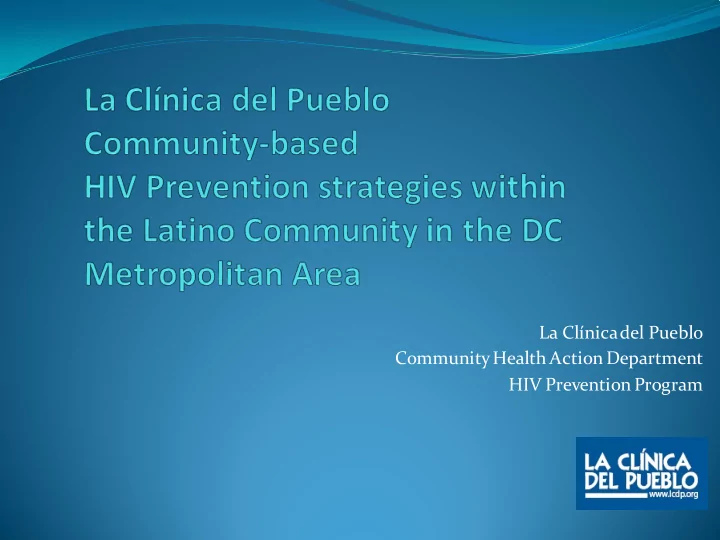

La Clínica del Pueblo Community Health Action Department HIV Prevention Program
La Clínica del Pueblo Founded in 1983 – comprehensive community-based clinic in Washington - DC. An HIV testing agency since 1989 Provides a full continuum services from prevention to care for HIV positive and high-risk negative individuals Develops and implements its overall services in collaboration with its clients
The Need Disparities in health status and health services create a higher HIV risk in Latino immigrants: Linguistic barriers Social and legal obstacles related to immigration status Access to health insurance and medical and mental health services Culturally specific beliefs and practices that create risk Social stigma Close gap between the Latino immigrant community and access to services/care.
Community HIV Prevention Strategies Core Elements Media Campaigns Peer-based education and outreach Business Network Consulate Network Safe Space for HIV testing and stigma prevention
HIV Prevention Strategies: core elements Media Campaigns Television coverage and promotion of events by Telemundo and Univision Print media campaigns, metro stations and metro buses Radio campaigns and promotion
HIV Prevention Strategies: core elements Peer based education and outreach Peer network Partnership network Small group activities Role model stories Stage-based encounters Confidential and free HIV testing
HIV Prevention Strategies: core elements Community/Business Network Businesses and agencies in the community who support and endorse our strategies. Restaurants, laundromats , grocery stores, beauty salons, bakeries, bars, clubs, etc..
HIV Prevention Strategies: core elements Consulate Network El Salvador, Guatemala, Honduras, Mexico, and Nicaragua First point for reaching newly immigrated Education, prevention, and outreach HIV testing
HIV Prevention Strategies: core elements Safe Space Walk-in, confidential, free of charge CTR at LCDP main site ¡Empodérate! Center Serves over 200 young Latino and young Latina TG women annually Prevention, education, services navigation, and social support for high-risk negative and those living with HIV Gender-violence prevention “Entre Amigas” Support group for immigrant women living with HIV and survivor of gender-based violence
Promising Results 2012 2013 2014 Counseling and HIV testing sessions (unduplicated) 2,471 2,454 2,599 MSM 205 605 879 Transgender 23 41 105 Unique HIV Reactive Results 21 19 17 Unique HIV System Navigation Clients 51 35 51 HIV System Navigation Sessions 445 718 708 HIV SN Clients Successfully Linked to care/services 46 35 49 Unique high risk MSM and TG navigation clients n/a n/a 67 Navigation Sessions for high risk MSM and TG clients n/a n/a 663 Street Outreach Encounters 25,798 14,669 2,598 HIV Prevention and Education Sessions 1,420 870 1,258 Community Outreach Events 332 163 43 Health Fairs 3 3 7 Community Forums n/a n/a 2 Condoms Distributed 115,968 50,592 101,611
Promising Results In 2013 La Clínica del Pueblo diagnosed 40.4% of all the Latinos diagnosed with HIV in DC through CTR – public funded. In 2014 91% of clients were linked to care after diagnose Monitored at 6, 9 and 12 months. 50% of clients navigated already had a VL <20 at the 6 months follow up
LCDP Commitment to the Community More than thirty years after La Clínica’s first team of volunteers treated its first patients, La Clínica continues to espouse the principle of health care as a human right, working to ensure that the Latino community has access to high quality, linguistically and culturally appropriate care .
GRACIAS
Recommend
More recommend